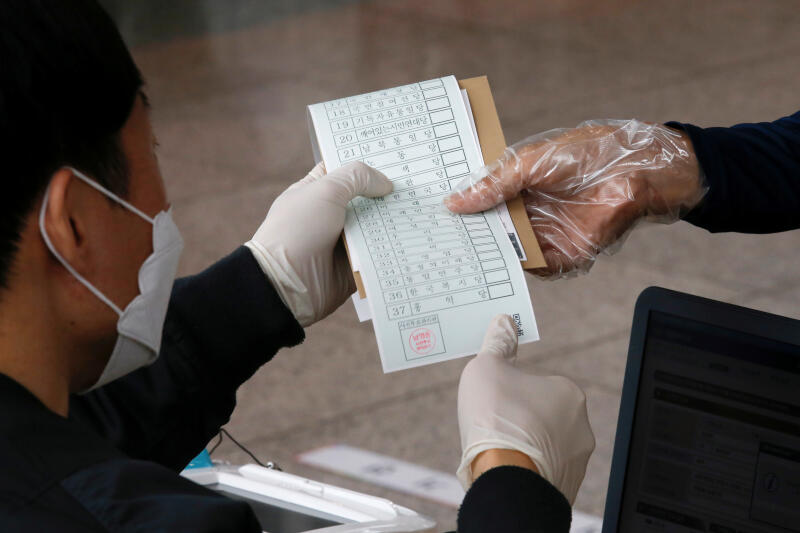Coronavirus: South Koreans go to the polls amid pandemic
Sign up now: Get insights on Asia's fast-moving developments

A poll worker hands out a voting pass in Seoul on April 10, 2020.
PHOTO: REUTERS
SEOUL - Armed with masks and gloves, South Koreans will go to the polls on Wednesday (April 15) to elect 300 parliamentary lawmakers amid the coronavirus outbreak.
The once-in-four-years legislative election is widely seen as a vote of confidence for President Moon Jae-in, whose five-year term will end in mid-2022.
Experts expect the ruling Democratic Party (DP) to extend its lead in Parliament, given that the government's handling of the virus outbreak is viewed positively at home and abroad. South Korea has received international praise for its massive testing capability and other innovative measures, such as drive-through testing and high-tech contact tracing.
The coronavirus has infected 10,564 people in the country and killed 222. About 2,800 patients are undergoing treatment.
The number of new cases has fallen from a high of 813 on Feb 29 to below 50 for six days in a row as an intensive social distancing campaign that started on March 21 remained in place.
President Moon's approval rating rose to a 17-month high of 54.4 per cent last week, according to a Realmeter survey which attributed the rise to public assessment that the government has done well in containing the virus.
Surveys also show that voters consider the pandemic as the biggest factor in their decision.A recent poll showed that 72.6 per cent of respondents rated the government's response to the outbreak as positive.
The National Election Commission (NEC) has said that public safety at polling stations will be a priority to prevent any possible spread of the virus.
All 14,330 polling stations and 251 counting stations will be disinfected by polling day, the NEC said.
Polling stations will remain open on Wednesday from 6am to 6pm , with strict safety measures in place.
Voters will be subject to temperature screening and those registering temperatures of 37.5 deg C or higher or display respiratory symptoms will have to vote at a separate booth.
Facts and figures on the election
- Number of seats in Parliament: 300 (253 single-member constituencies, 47 proportional representation seats)
- Number of seats in Parliament: 300 (253 single-member constituencies, 47 proportional representation seats)
- Number of parties taking part: 35, a record
- Number of polling stations: 14,330
- Number of eligible voters: 43 million
- Number of early voters: 11.7 million or 27 per cent, a record. Overall voter turnout in the last GE in 2016 was 58 per cent
- Number of people voting from home by mail: 100,529
- Number of quarantined voters: 50,000
Voters will also be reminded to keep at least 1m apart, to sanitise their hands and wear disposable gloves before casting their ballots.
Polling stations will be kept ventilated and disinfected regularly, said the NEC.
Some 150,000 people will be deployed to man polling stations, and another 70,000 are helping at counting stations.
More than a quarter, or 11.7 million, of the 43 million eligible voters have already cast their votes in two days of early voting last week.
This marks a record high turnout of nearly 27 per cent as many flocked to vote early to avoid running into crowds on polling day.
Tuesday was the last of 13 days of campaigning, which saw most candidates cutting back on ground activities and face-to-face encounters with voters. Instead, they boosted their online presence with videos and social media engagements to win votes.
Two former prime ministers, Mr Lee Nak-yon from the ruling DP and Mr Hwang Kyo-ahn from the main opposition United Future Party (UFP), will go head to head in a high-profile battle in the Jongno ward in central Seoul.
Both are seen as potential presidential candidates and the Jongo seat has often served as a springboard to the Blue House or presidential office.
In a final pitch for support, Mr Lee said at a party meeting last Wednesday that it was crucial for the DP to gain a majority in Parliament to manage state affairs smoothly. The party now has 123 seats, only one more than UFP.
The UFP, however, is appealing to voters to end "the Moon administration's dictatorship".
Many observers, however, think that the ruling party will win big on the strength of the government's coronavirus campaign.
Dr Lee Jae-hyon of the Asan Institute for Policy Studies told The Straits Times: "No one has a doubt that DP will win. The government has done a good job in dealing with the coronavirus. President Moon is still popular, while the opposition is ineffective and lacks vision and policy alternatives."


